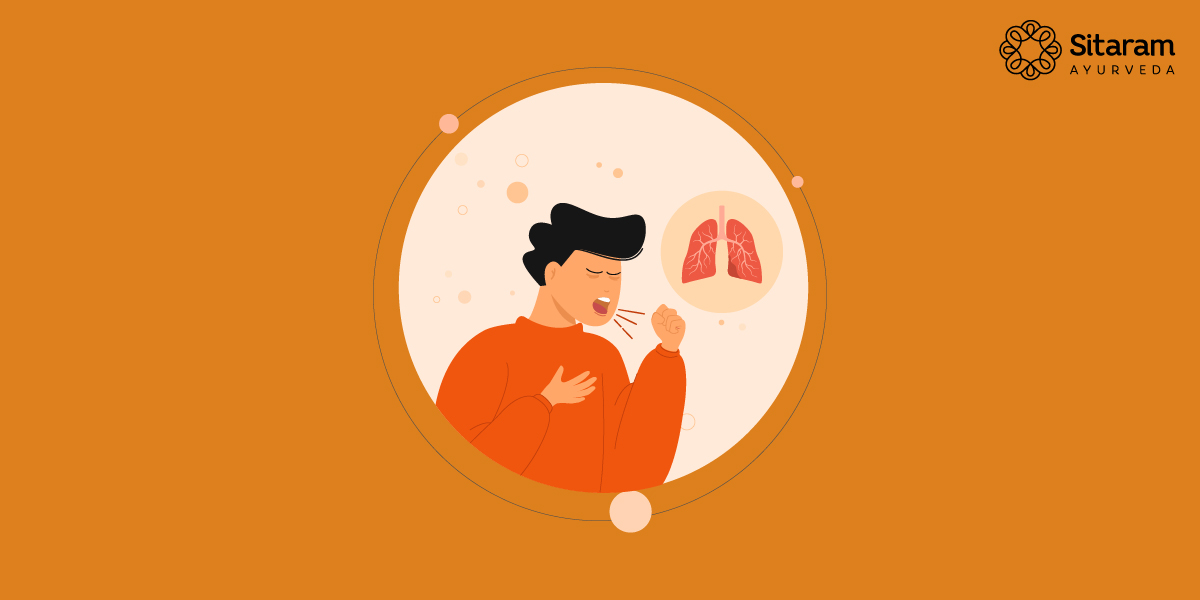Ayurvedic Remedy for Cough- Effective Solutions for Respiratory Health

Ayurveda treats respiratory diseases by addressing the underlying reason (imbalanced doshas), which causes distress and hinders function, rather than only treating the infection brought on by environmental allergens. The science clearly explains how respiratory ailments are to be treated for the removal of the disease’s symptoms at their source. Also, why is relying on Ayurveda for respiratory disease therapy the safest course of action? Let’s see here.
For some individuals with inadequate immunity, springtime or winter coughs might develop into chronic ones. According to how long the symptoms last—less than 3 weeks, 3 to 8 weeks, or more than 8 weeks in a row—coughs can be classed as acute, subacute, or chronic.
There are many different reasons for coughs, including infectious and environmental factors. The most frequent causes of subacute to chronic coughs are postnasal drip and post-infectious coughs. Numerous issues impacting various systems can be brought on by an excessive and chronic cough. These side effects could include social embarrassment, lower quality of life, dizziness, headache, chest pain, and fainting from coughing.
After COVID infections, we have also observed that many persons are presenting with a variety of minor to significant chronic health concerns. These health issues might range from physical symptoms like a persistent cough, fatigue, or light-headedness to emotional ones like anxiety or despair or insomnia.
According to our observations, the lungs are where post-covid effects are most frequent. Naturally, the effects vary with age and other underlying health conditions, but poor dietary and lifestyle choices can also have a serious negative impact on the lungs. Some patients furthermore endure respiratory issues or persistent sinus problems in addition to a chronic, severe cough that makes it difficult to breathe and disrupts sleep.
Ayurvedic Management for Chronic Coughs
Ayurveda proposes special guidelines for treating any disease. To treat specific doshas, substances with opposing qualities are frequently suggested. It is vital to do Snehapana (oelation) in cases where a chronic dry cough produces ongoing discomfort and is linked to Vata. The purification therapies play a significant and important part in effectively eliminating toxins from the body while also organically and holistically aiding in cleansing. It also enhances the digestive process, which regulates the vitiated Vata and Kapha doshas. The right management ensures that the disorder’s physical cause—the digestive system—is balanced in addition to providing immediate effect for respiratory conditions.
‘Muhur-Muhur’ (frequently repeated method) is the method suggested by Ayurvedic classics to treat cough and its complications. This method enables continuous contact between the medication and saliva and the irritated mucosa. As a result, dryness is quickly corrected and inflamed mucous membranes quickly recover.
Common Ayurvedic medicines for Cough
Sitaram Ayurveda’s Bronchosap granules, Vyoshadi vatakam, Thalisapatradi choornam, Sitopaladi choornam are best to treat throat infection and chest congestion. Dashamool cough syrup and Kofsap are having promising effects on treating all types of chronic cough disorders. Herbs like shunti (ginger), pippali (long pepper), maricha (pepper), twak (cinnamon), tulsi (holy basil) etc are best in treating respiratory conditions.
Studies have also demonstrated that tulsi can aid in thinning mucus and lessen cough symptoms brought on by allergies, asthma, or lung conditions. Tulsi is planted in Hindu homes in India likely because of its reputation as “mother nature’s medicine” in Ayurveda and the several advantages it offers. Another herb that is frequently utilized in Ayurvedic treatment is ginger. Recent studies have revealed that ginger has various active substances with anti-inflammatory and antioxidant characteristics to lessen cough. You can consume fresh or dried ginger powder.
Other Home Remedies for Cough
- Apart from taking the herbs mentioned above, there are other ways to treat coughs naturally at home. Some of them are:
- Steam – Inhaling steam can help clear mucus from the lungs. You can also use medicated oils to infuse in the steam, that enhances the action.
- Gargling with warm salt water or warm water with turmeric.
- Turmeric with Honey, prepared as a paste will cure sore throat and other infections.
- Avoid cold foods: Avoid dairy and dairy products, bananas, cold fruit juices and other cold foods or refrigerated items.


 Sign In
Sign In Cart
Cart